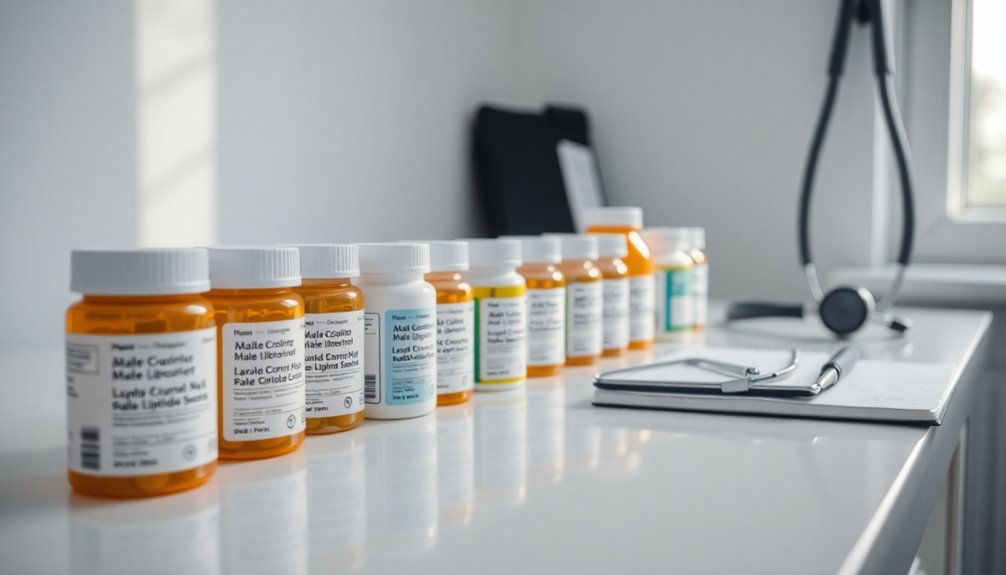To reduce your sex drive, start by examining lifestyle factors like diet and exercise. Regular physical activity can help balance hormones, while foods like spearmint and licorice might lower libido. Be mindful of alcohol consumption, as it can disrupt testosterone levels. Managing stress through techniques like meditation can also help. Consider professional help to address psychological factors or relationship dynamics that impact your desires. Building emotional intimacy through non-sexual activities may shift your focus. If you're looking for more insights on effective strategies and approaches, there's more to explore that could help you achieve your goal.
Key Takeaways
- Engage in regular physical exercise to help balance hormones and potentially reduce sex drive.
- Incorporate anti-aphrodisiac foods, such as spearmint and licorice, into your diet.
- Limit alcohol and caffeine intake to help regulate energy levels and stress, which can impact libido.
- Practice mindfulness techniques like meditation and deep breathing to manage heightened sexual urges and anxiety.
- Seek professional help, including therapy or counseling, to address psychological factors affecting sexual desire.
Understanding Male Sex Drive

Understanding male sex drive involves recognizing the complex interplay of biological, psychological, and social factors that influence libido. At the heart of this drive are testosterone levels, which peak in early adulthood and decline with age, potentially affecting your sexual desire.
Psychological factors, like stress and anxiety, can also take a toll; nearly 50% of men face sexual dysfunction related to mental health issues at some point. Additionally, the quality of your interpersonal relationships can greatly impact your libido—unresolved conflicts often lead to decreased sexual desire.
Finally, lifestyle choices, including diet and exercise, play an essential role. Poor health and sedentary behavior can correlate with lower sexual desire, underscoring the importance of a well-rounded approach to maintaining a healthy male sex drive.
Factors Affecting Libido

Libido in males is shaped by various factors that can greatly influence sexual desire. Testosterone levels play a significant role; as they decrease with age, you may experience a low sex drive.
Psychological factors like stress and anxiety can further dampen your libido, emphasizing the connection between mental health and sexual wellness.
Lifestyle changes, including diet and exercise, also impact sexual desire, as a balanced diet and regular activity can enhance hormone levels.
Additionally, substance use, such as alcohol and recreational drugs, can lead to hormonal imbalance, negatively affecting libido.
Relationship dynamics are essential too; unresolved conflicts and poor communication can erode emotional intimacy, making it harder to maintain a healthy sex drive.
Lifestyle Changes for Reduction

To effectively reduce your sex drive, consider making some lifestyle changes.
Regular physical exercise, healthy dietary choices, and stress management techniques can play a key role in balancing your hormones and promoting a calmer mindset.
Regular Physical Exercise
While many mightn't realize it, regular physical exercise plays an essential role in managing sex drive in males. Engaging in aerobic exercises, like running or cycling, for at least 150 minutes a week can lower testosterone and help reduce sex drive.
Combining endurance training with resistance workouts not only promotes muscle health but also modulates hormonal responses, decreasing sexual urges. Establishing a consistent exercise routine enhances overall hormone balance and boosts self-esteem, allowing you to develop a healthier perspective on sexual desires.
Additionally, regular physical activity reduces stress and anxiety, which can heighten sexual desire. By incorporating these practices into your life, you can achieve a more balanced approach to managing your libido.
Healthy Dietary Choices
Making healthy dietary choices can greatly influence your sex drive. Incorporating anti-aphrodisiacs like spearmint and licorice can help lower testosterone levels, potentially reducing your libido.
Focus on a balanced diet rich in fruits, vegetables, whole grains, and lean proteins to support overall health and hormonal balance. Reducing processed foods and high-sugar items stabilizes your energy levels and mood, which can indirectly impact sexual desire.
Staying hydrated and consuming omega-3 fatty acids from sources like fish promotes heart health and reduces stress, contributing to a healthier libido.
Additionally, limiting caffeine and alcohol consumption can help manage anxiety and enhance your overall well-being, leading to a decrease in unwanted sexual urges.
Stress Management Techniques
Effective stress management techniques can play an essential role in reducing an excessive sex drive in males. Engaging in regular physical exercise, like aerobic activities, helps reduce stress levels and promotes endorphin release, improving your mood.
Incorporating mindfulness techniques, such as meditation or yoga, effectively decreases anxiety and manages heightened sexual urges. Establishing a consistent sleep routine guarantees adequate rest, which is vital for balancing hormone levels that affect libido.
Additionally, relaxation techniques, like deep breathing exercises, can mitigate stress responses and regulate sexual desire.
Finally, maintaining a balanced diet rich in omega-3 fatty acids, antioxidants, and vitamins supports mental health and helps you lower excessive sex drive by reducing stress levels overall.
Dietary Considerations

When it comes to reducing your sex drive, dietary choices play a key role.
Incorporating anti-aphrodisiac foods like spearmint and licorice, while being mindful of alcohol intake, can influence your libido.
A balanced diet rich in nutrients can help stabilize your overall hormonal health, making it easier to manage your sexual desire.
Anti-Aphrodisiac Foods
If you're looking to reduce sex drive, incorporating anti-aphrodisiac foods into your diet can be a practical approach. Certain foods like spearmint and licorice may lower testosterone levels, potentially leading to a reduced sex drive. While soy products can influence hormonal balance, the evidence is still inconclusive.
High-fiber foods such as whole grains and leafy greens promote overall health and may help stabilize blood sugar levels, indirectly managing libido. However, be cautious with excessive consumption of certain anti-aphrodisiacs, like white beans and peanuts, as they may counteract the benefits of healthy fats found in avocados and nuts.
| Anti-Aphrodisiac Foods | Effects on Libido |
|---|---|
| Spearmint | Lowers testosterone |
| Licorice | May reduce sex drive |
| Soy Products | Inconclusive effects |
Impact of Alcohol
While enjoying a drink can be a social experience, it's important to recognize how alcohol impacts male sex drive.
Alcohol consumption can lower testosterone levels, leading to reduced libido and potential sexual dysfunction. Excessive intake impairs the central nervous system, often resulting in erectile difficulties and diminished sexual desire.
Although moderate alcohol consumption might offer a slight aphrodisiac effect, high levels typically decrease performance and desire. Chronic use can also damage the liver, further disrupting hormone regulation and notably decreasing libido.
By reducing alcohol intake, you can promote overall health and potentially restore normal testosterone levels, positively influencing your sexual drive.
Prioritizing moderation is key to sustaining both your libido and overall well-being.
Balanced Nutritional Choices
Balanced nutritional choices play an essential role in managing male sex drive. Incorporating foods known as anaphrodisiacs, like spearmint and licorice, can help lower testosterone levels and reduce sex drive.
Focus on a diet rich in fruits, vegetables, and whole grains to support overall health, which in turn enhances your mental and physical well-being. Reducing high-sugar and high-fat foods stabilizes hormone levels, potentially decreasing libido.
Include foods high in phytoestrogens, such as soy, as they may impact testosterone levels, though their effectiveness varies. Staying hydrated and limiting caffeine and alcohol also help regulate energy levels and stress, further influencing sexual desire.
Psychological Approaches

When you're looking to manage a heightened sex drive, psychological approaches can play an essential role. Engaging in cognitive-behavioral therapy helps you identify and modify thoughts that contribute to increased sexual urges, leading to better managing libido.
Mindfulness practices, like meditation and deep breathing, reduce anxiety and stress, further lowering unwanted desires. Participating in non-sexual activities that promote emotional intimacy, such as spending quality time with loved ones or hobbies, redirects your focus from sexual thoughts.
Journaling about your feelings and urges offers insight into triggers, helping you understand your libido better. Finally, open communication with your partner about desires and boundaries fosters support, leading to a healthier approach to managing your sex drive.
Medical Interventions

To effectively manage a high sex drive, considering medical interventions can be an essential step.
Medications like anti-androgens can block testosterone's effects, effectively reducing libido by lowering hormone levels linked to sexual desire. Selective serotonin reuptake inhibitors (SSRIs), often prescribed for depression, may decrease libido as a side effect, making them a potential option for you.
Hormonal treatments, such as GnRH agonists, can suppress testosterone production and are useful in cases of hypersexuality or prostate cancer.
Consulting with a healthcare provider is crucial to determine the appropriateness of these medications and adjust them as needed.
Regular counseling can help monitor the impact of any medical interventions on your libido and overall sexual health.
Seeking Professional Help

Seeking professional help can be an essential step in managing a high sex drive, especially when underlying psychological or relational factors are at play.
Mental health professionals can guide you through evidence-based therapies, like cognitive-behavioral therapy (CBT), to address compulsive sexual behavior and reduce unwanted urges.
Consulting a healthcare provider is important to evaluate potential hormonal imbalances or medical conditions influencing your libido, which can inform treatment options.
Sex therapists specifically tackle concerns related to sexual desire and intimacy, providing strategies to enhance communication with partners.
Professional guidance also helps you explore underlying issues, such as anxiety or stress, that may worsen your high sex drive, promoting a healthier sexual experience overall.
Don't hesitate to seek help; it can make a significant difference.
Frequently Asked Questions
How to Reduce Sex Drive in Males Naturally?
To naturally reduce your sex drive, start by incorporating regular exercise into your routine; it can help lower testosterone levels and shift your focus.
You might also try adding anaphrodisiac foods like spearmint and legumes to your diet.
Practicing mindfulness through meditation or yoga can alleviate stress, promoting emotional balance.
Make certain you get enough sleep, as fatigue can heighten urges.
Finally, consider seeking therapy to explore any underlying issues and develop coping strategies.
How to Reduce Sex Drive in Men?
"An ounce of prevention is worth a pound of cure."
To reduce sex drive, you can start by incorporating regular exercise into your routine.
Mindfulness techniques like meditation help you manage urges effectively.
Dietary changes, such as adding anti-aphrodisiacs like spearmint, may also assist.
If needed, don't hesitate to seek counseling or therapy for deeper exploration of your feelings.
Consulting a healthcare provider about medications can further help you manage libido levels.
Why Is My Sex Drive so High Male?
Your high sex drive might stem from various factors.
Elevated testosterone levels often fuel libido, which can fluctuate due to age, health, and lifestyle choices.
Psychological aspects like stress or anxiety may also play a role.
Additionally, frequent exposure to sexual stimuli, such as pornography, could heighten your arousal.
Ultimately, certain medical conditions might contribute, so it's wise to consult a healthcare professional if you're concerned about your libido.
Is There a Pill to Stop Horniness?
You might think there's a magic pill that can simply turn off your horniness, but it's not that straightforward.
While some medications can lower libido, they're typically prescribed for specific health issues rather than just to curb desire.
It's essential to consult with a healthcare provider, as they'll help you understand the options available and the potential side effects.
Conclusion
To sum up, reducing your sex drive can be achieved through various lifestyle changes, dietary adjustments, and psychological strategies. For instance, a man named John found success by incorporating regular exercise and mindfulness meditation into his routine, which helped him manage his libido effectively. Remember, it's crucial to explore what works best for you and seek professional help if needed. Taking control of your desires can lead to a more balanced and fulfilling life.










